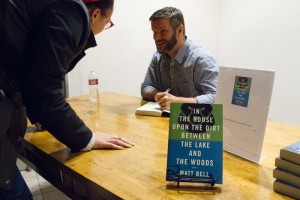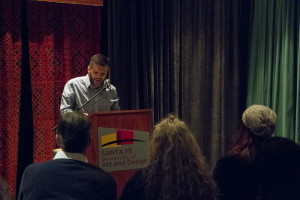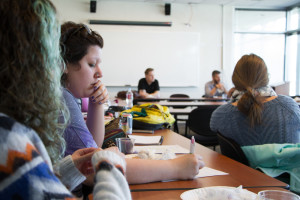Tags
Related Posts
Share This
Matt Bell Visit

Students line up to chat with Matt Bell and purchase a signed copy of his latest book. Photo by Ash Haywood
After emphasizing nearly every syllable in his reading, enrapturing the collection of SFUAD students and assorted Santa Fe locals, Matt Bell thanked the audience several times. However, his Mid-Western ‘oh gosh’ attitude failed to puncture the alternating intense and melancholy reading of his debut novel In the House upon the Dirt between the Lake and the Woods and excerpts from his upcoming sophomore release Scrapper.
Listeners looked off in the distance staring at nothing, imagining the fantastical setting he posed in In The House. Bell doesn’t see his work as magical realism, but more of a warped fairy tale—a fairy tale taken to its natural conclusion.

Writer Matt Bell captivates the audience during a reading in the O’Shaughnessy Performance Space. Photo by Ash Haywood
“In European fairy tales there’s often a Happily Ever After that hides the rest of the story,” Bell said. “There’s so many heroines in fairy tales and the reward is always domesticity. And that seems very oppressive to me. We’re taught in fiction to make rounded characters and in most fiction they’re not, except for what the reader brings to them. Because it is left out, the reader fills that hole. Terrible terrible stuff happens in fairy tales, and it leaves the reader to bring in that morality.”
Bell visited the university, with help from Creative Writing faculty member James Reich, as a part of the ongoing visiting writer series. In his one day Feb. 17, he stopped by Reich’s Modernism class, and also attended a lunch Q&A. A collection of 16 students attended the lunch, hesitant to grab a slice of pizza, in fear of missing what Bell had to say. He established his literary cred early, confessing to reading 100 books a year, and writing close to 1,000 words a day.
“Someone eats a baby on page six,” he said in reference in relating his unique style to readership. “It’s complicated trying to sell that. Eating a baby should always be complicated.”
But despite his sometimes, let’s face it, often difficult subject matter, Bell’s real interest lies in the individual line. With two novels already finished, he has also dabbled in poetry. He credits his fascination with poetry as a contributing factor in his celebrated style.
I read a lot of poetry,” he said. “It’s really important to me as a fiction writer to read a lot of poetry. I’m very interested in the acoustics of language, the sound of prose.”
After the reading, attendees lined up to buy a copy of In The House, students and teachers took to the Creative Writing Facebook page to celebrate a successful, thought provoking reading.

Matt Bell meets with Creative Writing students to reflect and discuss the process of his writing. Photo by Ash Haywood
Bell’s new novel, Scrapper, releases next September. Below are a collection of quotes from his Q&A.
On his Writing Process
“I write really fragmentary when I’m drafting. I’ll write a line or image or sound and just try to unpack that and carry it as long as I can. It usually goes for like a half a page or a paragraph and I’ll end up with this pile of fragments. Then I’ll see maybe these two go together. You’re brain can’t stand being uncertain of what you’re doing and I really try to stay uncertain as long as possible.”
On Crafting a Novel
“It happens with a story, it happens with a poem, it happens with a sentence. With a novel, it’s just on this grand scale. I think I handle it mostly by staying in the moment that I’m in. I can’t think of the novel as a whole, especially when I haven’t written it yet.”
On his Time as a Undergrad
“I was a good writer, I was clearly one of the better writers in my workshop, but I couldn’t see the gap between my work and what was being published. And the gap was so big from where I was to where I wanted to be. I just didn’t understand what made them different, and that took a long time.”
On his Favorite Scene in his New Novel
“When I got the edits back, I got to that page, and my editor just put a big X through it. He saw it as an aside, that it didn’t need to go here. Maybe it was. But the reader can give me one paragraph for myself. You can read my new book when it comes out, and when a character is playing Centipede in some arcade, you can be like ‘your editor was right.’”
On Submitting his Work for the First Time.
“I had five stories that I wanted to send out, I sent them out to 10 magazines. I was so full of hope. I worked really hard on them. But if you send out 50 submissions in one day, it means that you get a rejection, like, every three days for the next six months. I didn’t submit again for three years.”
On Confidence
“When you’re not confident, you have to pretend that you are. Confidence is a funny thing when you’re making art.”
On his Early Influences
“Vonnegut, Saunders, Carson, McCarthy. I think for me, when starting out, it was very imitative. I wanted there to be more books by the people that I liked. I’m not a very autobiographical writer. I don’t fight a lot of squids. Not yet. The autobiographical elements are really what art I was engaging with while I was writing. I think I want to be constantly influenced.”
On his Physical Writing Practice
“I couldn’t write at a coffee shop, I’d be too distracted. Too aware that I was writing. You have to differentiate yourself from the screenwriters.”
On Writing in the Morning
“If you write every day, you burn through your defaults very fast. Night writing I’d be too tired. There’s something so satisfying about being done with it. I worked in the restaurant business for 10 years. I was managing a Mongolian barbeque. It was so much easier to go into work and do this job that I hated, if I had already written.”
On Pushing through Writer’s Block
“You have to write through the bad stuff to get to the good stuff. There’s no doubt, because the bad stuff will just sit there in the way. There was a while, before In The House actually, where I would just start a new story every day. I would write these 1,000 word stories and I knew they were terrible. One hundred words in, I knew they were terrible. That story about the amnesiac one armed detective isn’t going to work. But I would make myself sit there for three hours and work on it. It’s hard to do that, it’s miserable. I think you’re enthusiasm is going to wane, but you have to keep writing.”
On his Revision Process
“My thing is you have to retype it. In revision, you can reuse something, but you have to retype it. If it didn’t mean enough for you to type it twice, then maybe it isn’t good enough to be sent out in the world.”






 Jackalope Magazine is the student magazine of Santa Fe University of Art and Design. Building on the interdisciplinary nature of our education, we aim to showcase the talent of our university and character of our city.
Jackalope Magazine is the student magazine of Santa Fe University of Art and Design. Building on the interdisciplinary nature of our education, we aim to showcase the talent of our university and character of our city.
0 Comments
Trackbacks/Pingbacks